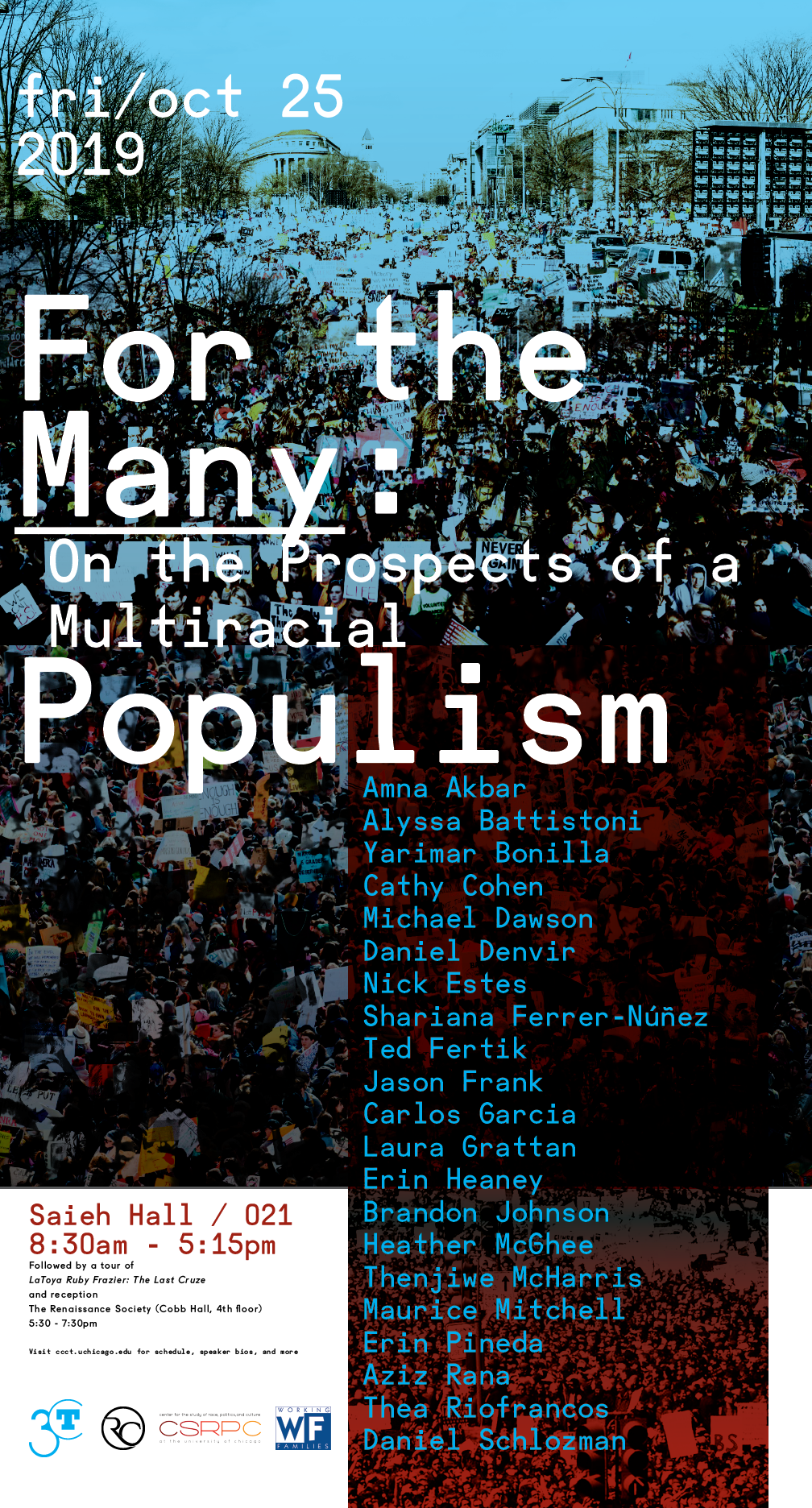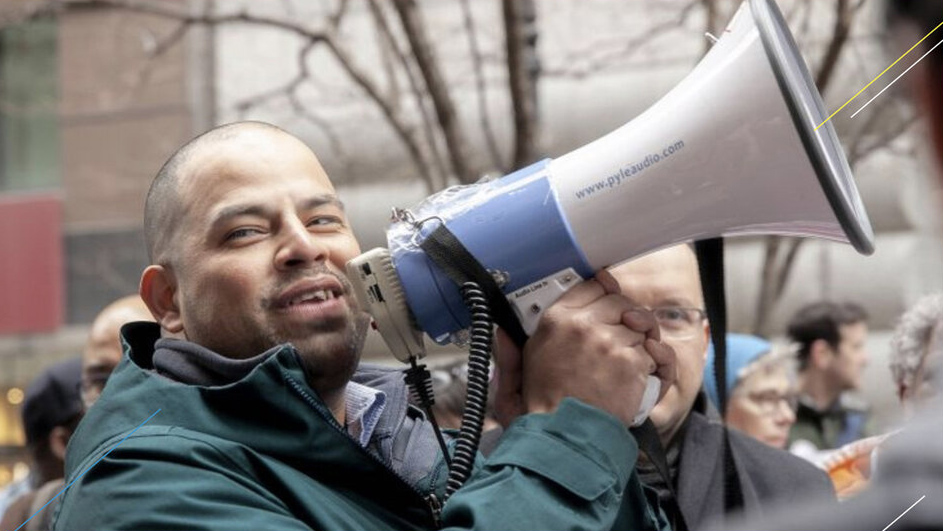Categories
For the Many: On the Prospects of a Multiracial Populism
Friday, October 25, 2019, 8:30am-7:30pmThe Left is once again resurgent in American politics. In Congress, Alexandria Ocasio-Cortez, Rashida Tlaib and Ilhan Omar have become the face of a left challenge to the Democratic Party status quo. In Chicago, movement candidates in races across the city propelled five socialists into aldermanic seats. From the Movement for Black Lives to #NODAPL and a wave of labor strikes, these electoral victories are buoyed by a politics of taking the streets. In each of these contexts, young people of color and women have led the call for a new kind of politics and their demands are already shaping the debates leading up to the 2020 democratic primary. Democratic candidates are touting Medicare for All, the Green New Deal, and even reparations.
This moment calls for a reconsideration of how we might build a political program for the many. What would a multiracial class-based populism require? What historical and global lessons might we bring to bear on this question? And how does our specific context both enable and disable movement and electoral politics that centers an anti-racist, feminist and internationalist orientation? This day-long symposium tackles these questions by bringing together scholars, organizers, and political strategists for a discussion whose goal is to achieve clarity on the way forward.
Central to the framing of the symposium are two basic realities that structure the political field. On the one hand, the economic, climate, and democratic crises brought on by the astonishingly plutocratic nature of American politics have become too glaring for even the most rose-tinted glasses to obscure. There is widespread acknowledgement that the American political class as a whole is complicit in, when not actively abetting the oligarchization of American politics. Therefore the political moment is a populist one – that is, one that calls for a polarization of our politics, along broadly class lines, pitting an elite of politicians and plutocrats against a broader popular majority that has been losing out under the regime of the past forty years. At the same time, the dialectic of powerful movements for racial justice and liberation and a resurgent, open politics of white supremacy has forced the brute realities of structural racism into the center of American politics. America’s status as settler colony and imperial hegemon has rendered populism a vexed political project. “The many” have too often and too easily been yoked to “the white.”
The central political challenge for the American left in this moment is to build cross-racial, working class solidarity in a way that is truly emancipatory. It is to build a historic bloc of popular forces. We can call this politics “multiracial populism,” understanding from the outset that we cannot accept a politics of cross-racial working class solidarity where the price of that solidarity is a downplaying of the extent to which ours is a society built on racial capitalism, heteropatriarchy, settler colonialism, and empire. How do we construct a politics that is both majoritarian and emancipatory? This is our challenge, and our topic.
FRIDAY, OCTOBER 25, 2019
Saieh Hall 021
map
8:30am — Breakfast
provided for all participants
9:15am — Introduction
Maurice Mitchell, Working Families Party
9:30am — Panel 1: Global and Historical Lessons
Laura Grattan, Wellesley College
Thea Riofrancos, Providence College
Jason Frank, Cornell University
Erin Pineda, Smith College
Chair: Barbara Ransby, University of Illinois-Chicago
11:15am — Panel 2: Mapping the Political Landscape
Cathy Cohen, University of Chicago
Daniel Schlozman, The Johns Hopkins University
Amna Akbar, Ohio State University
Chair: Ted Fertik, Working Families Academy / Grassroots Policy Project
12:45pm — Lunch
provided for all participants
1:30pm — Panel 3: What do we want?
Aziz Rana, Cornell University
Alyssa Battistoni, Harvard University
Yarimar Bonilla, Rutgers University
Barbara Ransby, University of Illinois-Chicago
Chair: Heather McGhee, Demos/Institute of Politics, University of Chicago
3:15pm — Panel 4: Lessons from the Ground: Movement and Electoral Politics
Brandon Johnson, Cook County Board Commissioner, 1st District
Carlos Garcia, Phoenix City Council
Julia Daniel, Showing Up for Racial Justice
Chair: Dan Denvir, The Dig Radio
This session will be live-streamed to Facebook.
The Renaissance Society
Cobb Hall, 4th floor
map
5:30pm — Tour of LaToya Ruby Frazier: The Last Cruze exhibition / reception
Amna Akbar is Associate Professor Law at Ohio State University. Her research and teaching focus on social movements, law reform, policing, race, and inequality. Her scholarship explores the intersections of national security and criminal law, and the potential of social movements to transform our thinking about law, law enforcement, and law reform. She writes broadly for academic and popular audiences, in outlets like NYU Law Review, UCLA Law Review, NOMOS, Citizenship Studies, the Journal of Legal Education, Law and Political Economy, the Nation, Boston Review, and more. In her teaching and lawyering work, she is deeply engaged with law and organizing in Ohio and around the country. For the 2018-2019 academic year, Professor Akbar was at Princeton University, as a Law and Public Affairs Fellow and Visiting Scholar.
Alyssa Battistoni is a political theorist and Environmental Fellow at Harvard University. She works on topics related to political economy, environmental politics, feminism, and the history of political thought, and writes about related issues for various publications including Dissent, n+1, The Nation, and Jacobin, where she is on the editorial board. Her book A Planet to Win: Why We Need a Green New Deal, co-written with Kate Aronoff, Daniel Aldana Cohen, and Thea Riofrancos, is out this fall with Verso.
Yarimar Bonilla is Professor in the Department of Africana, Puerto Rican and Latino Studies at Hunter College and in the PhD Program in Anthropology at the Graduate Center of the City University of New York. Bonilla is the author of Non-sovereign Futures: French Caribbean Politics in the Wake of Disenchantment (University of Chicago Press, 2012) and editor of Aftershocks of Disaster: Puerto Rico Before and After the Storm (Haymarket Press, 2019). Professor Bonilla’s next book project Shattered Futures — for which she was named a 2018 Carnegie Fellow —examines the politics of recovery in Puerto Rico after hurricane Maria and the forms of political and social trauma that the storm revealed. She is also at work on an ethnographic study of the Puerto Rican pro-statehood movement, tentatively titled The Unthinkable State, which traces how and why annexationism is a form of anti-colonial politics. Bonilla is a prominent public intellectual and a leading voice on Caribbean and Latin-X politics. She writes a monthly column in the Puerto Rican newspaper El Nuevo Día titled “En Vaivén,” is a regular contributor to publications such as The Washington Post, The Nation, Jacobin, and The New Yorker, and a frequent guest on National Public Radio and news programs such as Democracy Now!.
Cathy J. Cohen is a Professor at the University of Chicago and author of The Boundaries of Blackness: AIDS and The Breakdown of Black Politics and Democracy Remixed: Black Youth and the Future of American Politics. She is also co-editor of Women Transforming Politics: An Alternative Reader and founded and directs the GenForward Survey. Her articles have been published in numerous journals and edited volumes. In addition to her academic work, Cohen was a founding board member and co-chair of the board of the Audre Lorde Project in NY. She also served on the boards of Kitchen Table: Women of Color Press, the Center for Lesbian and Gay Studies (CLAGS) and the Arcus Foundation. Cohen was a founding member of Black AIDS Mobilization (BAM!) and a core organizer for two international conferences “Black Nations / Queer Nations?” and “Race, Sex, Power.” Cohen has served as an active member in numerous organizations such as the Black Radical Congress, ACT UP New York, and African American Women in Defense of Ourselves. She is also the founder and director of the Black Youth Project. Currently, she is helping to direct the new organization Scholars for Social Justice and serves on the Field Foundation board.
Jason Frank is Robert J. Katz Chair of Government at Cornell University. His research and teaching interests include democratic theory, American political thought, modern political theory, political aesthetics, populism, and the history of popular sovereignty. He is the author of Constituent Moments: Enacting the People in Postrevolutionary America, and Publius and Political Imagination, and the editor of Vocations of Political Theory and A Political Companion to Herman Melville. His research has been published widely in such journals as Political Theory, Public Culture, and Modern Intellectual History, and his political commentary has appeared in The New York Times and The Boston Review. He is currently completing a book titled The Democratic Sublime: On Aesthetics and Popular Assembly.
Laura Grattan is Jane Bishop 51′ Associate Professor of Political Science at Wellesley College and author of Populism’s Power: Radical Grassroots Democracy in America. Her current research focuses on movements that are resisting and imagining alternatives to the carceral state in the United States, including the Movement for Black Lives, prison abolition, and the anti-deportation movement. She is co-director of Wellesley’s Project on Public Leadership and Action, an initiative led by faculty who are committed to action-oriented, public-facing research.
Erin Pineda is Assistant Professor of Government at Smith College. She is the author of the forthcoming Seeing Like an Activist: Civil Disobedience and the Civil Rights Movement, which reinterprets the forms of action, strategic decisions and ethical claims posed by the enactment of civil rights disobedience in the 1950s and ’60s as generative sites of political theorizing—ones that offer a stark contrast to the narrative presented by canonical theories of disobedience. Her work has appeared in Contemporary Political Theory, Journal of European Political Thought, and History of the Present. Prior to coming to Smith College in the fall of 2017, she was Provost’s Postdoctoral Scholar in Political Science at the University of Chicago, and a faculty affiliate of the Center for the Study of Race, Politics and Culture.
Aziz Rana is a Professor of Law at Cornell Law School. His research and teaching center on American constitutional law and political development, with a particular focus on how shifting notions of race, citizenship, and empire have shaped legal and political identity since the founding. His book, The Two Faces of American Freedom (Harvard University Press) situates the American experience within the global history of colonialism, examining the intertwined relationship in American constitutional practice between internal accounts of freedom and external projects of power and expansion. His current book manuscript explores the modern rise of constitutional veneration in the twentieth century — especially against the backdrop of growing American global authority — and how veneration has influenced the boundaries of popular politics. He has also written essays and op-eds for such venues as n+1, The Boston Review, The New Labor Forum, The Chronicle of Higher Education, Jacobin, The Nation, The New York Times, Salon, and CNN.com.
Barbara Ransby is currently Distinguished Professor, in the Departments of African American Studies, Gender and Women’s Studies, and History at the University of Illinois at Chicago (UIC) where she directs the campus-wide Social Justice Initiative, a project that promotes connections between academics and community organizers doing work on social justice. Dr. Ransby is author of two award-winning books: Ella Baker and the Black Freedom Movement: A Radical Democratic Vision (University of North Carolina Press,); and Eslanda: The Large and Unconventional Life of Mrs. Paul Robeson (Yale University Press,). She is also author of a third book published in August 2018 entitled Making All Black Lives Matter: Re-imagining Freedom in the 21st Century (University of California Press.) The Ella Baker book was the recipient of 8 national book awards and recognitions including the Liberty – Legacy award from the Organization of American Historians; the Joan Kelly prize from the American Historical Association; and the James A. Rawley Prize (also from the AHA). Her second biography, Eslanda, was the recipient of the Letitia Woods Brown Memorial prize for the best book in African American women’s history in 2013 from the Association of Black Women Historians. She is also editor in chief of Souls: a critical journal of Black politics, culture and society, and serves on the editorial working group of the London-based journal Race and Class, and the Editorial Advisory Board of the “Justice, Politics and Power” book series at University of North Carolina Press. She publishes regularly in various publications including DISSENT, In These Times, Colorlines, and The Boston Review.
Thea Riofrancos is an assistant professor of political science at Providence College. She is the author of Resource Radicals: From Petro-Nationalism to Post-Extractivism in Ecuador (Duke University Press, 2020), and the co-author of A Planet to Win: Why We Need a Green New Deal, forthcoming this fall from Verso Books. Her writing has appeared in n+1, The Guardian, The Los Angeles Review of Books, Dissent, Jacobin, and In These Times. She is a member of the Democratic Socialists of America, and serves on the steering committee of the Ecosocialist Working Group.
Daniel Schlozman is Joseph and Bertha Bernstein Associate Professor of Political Science at Johns Hopkins University. He is the author of When Movements Anchor Parties: Electoral Alignments in American History (Princeton, 2015). He is now writing, with Sam Rosenfeld at Colgate University, a book on visions of party from Martin Van Buren to Donald Trump, and a book on financialization and center-left parties in the US and the UK.




